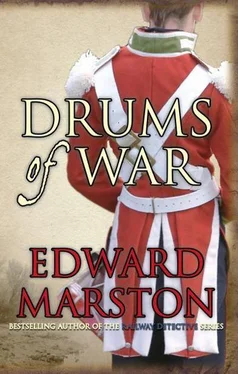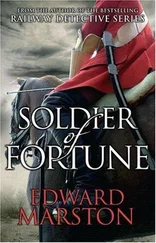Edward Marston - Drums of War
Здесь есть возможность читать онлайн «Edward Marston - Drums of War» весь текст электронной книги совершенно бесплатно (целиком полную версию без сокращений). В некоторых случаях можно слушать аудио, скачать через торрент в формате fb2 и присутствует краткое содержание. Жанр: Исторические приключения, на английском языке. Описание произведения, (предисловие) а так же отзывы посетителей доступны на портале библиотеки ЛибКат.
- Название:Drums of War
- Автор:
- Жанр:
- Год:неизвестен
- ISBN:нет данных
- Рейтинг книги:5 / 5. Голосов: 1
-
Избранное:Добавить в избранное
- Отзывы:
-
Ваша оценка:
- 100
- 1
- 2
- 3
- 4
- 5
Drums of War: краткое содержание, описание и аннотация
Предлагаем к чтению аннотацию, описание, краткое содержание или предисловие (зависит от того, что написал сам автор книги «Drums of War»). Если вы не нашли необходимую информацию о книге — напишите в комментариях, мы постараемся отыскать её.
Drums of War — читать онлайн бесплатно полную книгу (весь текст) целиком
Ниже представлен текст книги, разбитый по страницам. Система сохранения места последней прочитанной страницы, позволяет с удобством читать онлайн бесплатно книгу «Drums of War», без необходимости каждый раз заново искать на чём Вы остановились. Поставьте закладку, и сможете в любой момент перейти на страницу, на которой закончили чтение.
Интервал:
Закладка:
Corswaren was a little village that lay in a hollow beneath the whirring sails of its windmill. The Allied armies camped nearby. It was country they knew well from previous campaigns. At their back, less than twenty miles away, was the River Meuse, curving its way south. Ahead of them were the French lines. At 1 a.m. on 23 May, Marlborough sent off Brigadier-General Cadogan, one of his most trusted men, with an advance guard. Their orders were to reconnoitre the high ground between two rivers, the Mehaigne and the Little Gheete. Conditions were poor. After three days of pelting rain, there was a thick fog that night. Two hours after dispatching Cadogan, his quartermaster, Marlborough led the main body out of camp. Captain Daniel Rawson was with him.
The advance guard had ridden beyond the village of Merdorp when they encountered a French patrol. As soon as they heard distant firing, the patrol withdrew. Though there was full daylight now, mist was still swirling unpredictably around. Cadogan could see very little at first then something uncannily reminiscent of their experience at Blenheim occurred. The mist began to thin and lift. What he saw through his telescope was a wide sweep of open country with hardly any trees and hedges to impede movement. On a high ground some four miles off, he picked up clear signs of movement. Guessing that it was Villeroi's advance guard, Cadogan promptly sent a galloper to alert Marlborough. It was not until 10a. m that the brigadier- general and the commander-in-chief were able to survey the scene together. Marlborough was astonished at what he saw.
'It's just like Blenheim,' he said. 'It's a natural battlefield.'
He scrutinised it through his telescope. The vast expanse of land would allow huge numbers of soldiers to be aligned in rigid mass formation. It was a perfect arena for war. The rolling acres bore such a resemblance to the plain near Blenheim that Marlborough's spirits soared. As in all battles, his strategy was dictated by the nature of the terrain. Little discussion was required. It was obvious to him, his staff and the accompanying Allied officers that the engagement had to take place on the undulating plain between Taviers and Ramillies. All that remained was to deploy his cavalry and his troops. Three hours later, they were all in position. The battle of Ramillies was imminent.
'What are we waiting for?' asked Tom Hillier, holding his drum.
'Reinforcements,' said Hugh Dobbs. 'Some of our allies are late.'
'Where are they?'
'Shitting with fright behind a hedge, I expect. You can never trust foreigners, Tom. They always let you down.'
'Will there really be a battle this time?'
'That's what it looks like.'
'Who's going to win?'
'We are,' said Dobbs with a strained laugh.
He expected a comment from Hillier but his friend's attention had already wandered in a way that was wearisomely familiar. Since his flogging, Hillier had been withdrawn. Though he went through the drills with the other drummers and slept in the tent with his friends, he was no longer the fresh-faced, earnest young recruit. Eighty lashes had taken something out of him and replaced it with a brooding sadness. Instead of enjoying the company of the others, he was detached and melancholy. Nudging him in the ribs, Dobbs tried to bring him out of his dejection.
'This is what you joined the army for, Tom,' he said.
Hillier woke up. 'What's that?'
'You want to kick seven barrels of merde out of the Frenchies.'
'All we can do is to beat our drums.'
'Where would the rest of them be without us? We control the battle. It's the drum calls that tell the soldiers what to do.'
'It's not the same as holding a musket, Hugh.'
'Your time for doing that will come.'
'No, it won't,' said Hillier, flatly.
'I thought that was your ambition.'
'I don't have ambitions now.'
Once again Hillier's eyes glazed over as his mind drifted away. He was surrounded by thousands of men on the verge of battle yet he might have been somewhere entirely on his own. Dobbs had given up trying to understand his friend, still less hoping to talk him out of his prolonged misery. Even Hillier's uncle, Sergeant Welbeck, had failed to do that. The drummer was beyond help.
Dobbs didn't have to nudge his friend again. Someone rode up on a horse and turned the animal so that its flank knocked Hillier sideways, making him struggle to retain his balance. Looking down from the saddle was Major Cracknell.
'Watch where you're going, you numbskull,' he barked.
'I'm sorry, Major,' said Hillier, dully.
'I hope you keep your eyes open when battle commences.'
'Yes, Major.'
'You have a job to do.'
'Yes, Major.'
'Only time will tell if you've the stomach for a fight. I doubt very much if you have. It's always the same with the dregs of humanity we have to endure in our ranks. They're all cowards.'
'Begging your pardon, Major,' said Dobbs, defensively, 'but that's unfair on Tom. I know how brave he can be.'
'I don't see any bravery in dropping his breeches for a whore,' said Cracknell. 'Bravery is what a man shows in battle.' 'Yes, Major.'
'Did you hear that, Hillier?'
There was a long, considered pause. 'Yes, Major,' he said.
Daniel had never admired the Duke of Marlborough as much. He'd fought under his command in major battles before but had never been near him during the action. As part of his staff, he now had the privilege of watching him at close quarters. The person beside him was very different to the suave, urbane, congenial diplomat who was at ease in the courts of Europe. What he saw now was John Churchill, Duke of Marlborough, a soldier to his fingertips, bold, calm, decisive, vigilant, unflustered and bristling with energy, a supreme commander at the height of his powers. Despair and disappointment were behind him now. Marlborough had a golden opportunity for glory.
His army had been drawn up in standard battle formation. British battalions and squadrons were positioned in a double line near the Jeuche stream, their scarlet uniforms resplendent in the sun. The bulk of the Allied infantry — some 30,000 or more — occupied the centre ground opposite Offus and Ramillies. On their left were 69 squadrons of Dutch and Danish horse under the command of General Overkirk. Battalions of Dutch Guards were stationed on the extreme left. Daniel had noted the meticulous care with which Marlborough had sited his artillery. In all, he had 100 cannon and 20 howitzers at his disposal. A battery of 24-pounders was gathered in a cluster facing Ramillies. Other batteries overlooked the Gheete and a couple of pieces were attached to the Dutch Guards on the far left. On a battlefield as wide as this, artillery could never dictate the outcome because whole areas were beyond its reach. Marlborough had put his guns where they could do most damage and offer most protection to the cavalry and infantry.
Against this array of Allied power, Villeroi had marshalled his men along a concave line. On his extreme right were five battalions in Taviers and Franquenee. The main right wing of the Franco-Bavarian army consisted of 82 squadrons, interlined with brigades of infantry, facing the open plain. In the centre were 20 battalions and a dozen of the lethal triple-barrelled cannon were placed around Ramillies with additional foot in the rear. Overlooking the Little Gheete further north were more battalions and guns. As a final part of his deployment, Villeroi had put 50 squadrons of horse around the village of Autre- Eglise which, with Offus, was intended to anchor the left flank. There was one serious oversight. Because he deemed the marshes around the rivers impassable, the French commander had sent no troops to defend them.
Daniel was tingling with anticipatory delight as he scanned the battlefield. He felt certain that a momentous victory could be achieved. Of the two armies, neither had a marked numerical advantage but he knew that the Allied artillery was far superior. Marlborough had deployed his men in a more compact formation. While Daniel had been impressed by this, he didn't underestimate the enemy. Marshal Villeroi was an experienced and able commander, determined not to repeat the mistakes made by Marshal Tallard at Blenheim. His army was strongly posted but, as Daniel was quick to observe, in deciding to stand on the defensive, he'd surrendered the initiative. It was left to Marlborough to make the opening moves.
Читать дальшеИнтервал:
Закладка:
Похожие книги на «Drums of War»
Представляем Вашему вниманию похожие книги на «Drums of War» списком для выбора. Мы отобрали схожую по названию и смыслу литературу в надежде предоставить читателям больше вариантов отыскать новые, интересные, ещё непрочитанные произведения.
Обсуждение, отзывы о книге «Drums of War» и просто собственные мнения читателей. Оставьте ваши комментарии, напишите, что Вы думаете о произведении, его смысле или главных героях. Укажите что конкретно понравилось, а что нет, и почему Вы так считаете.












